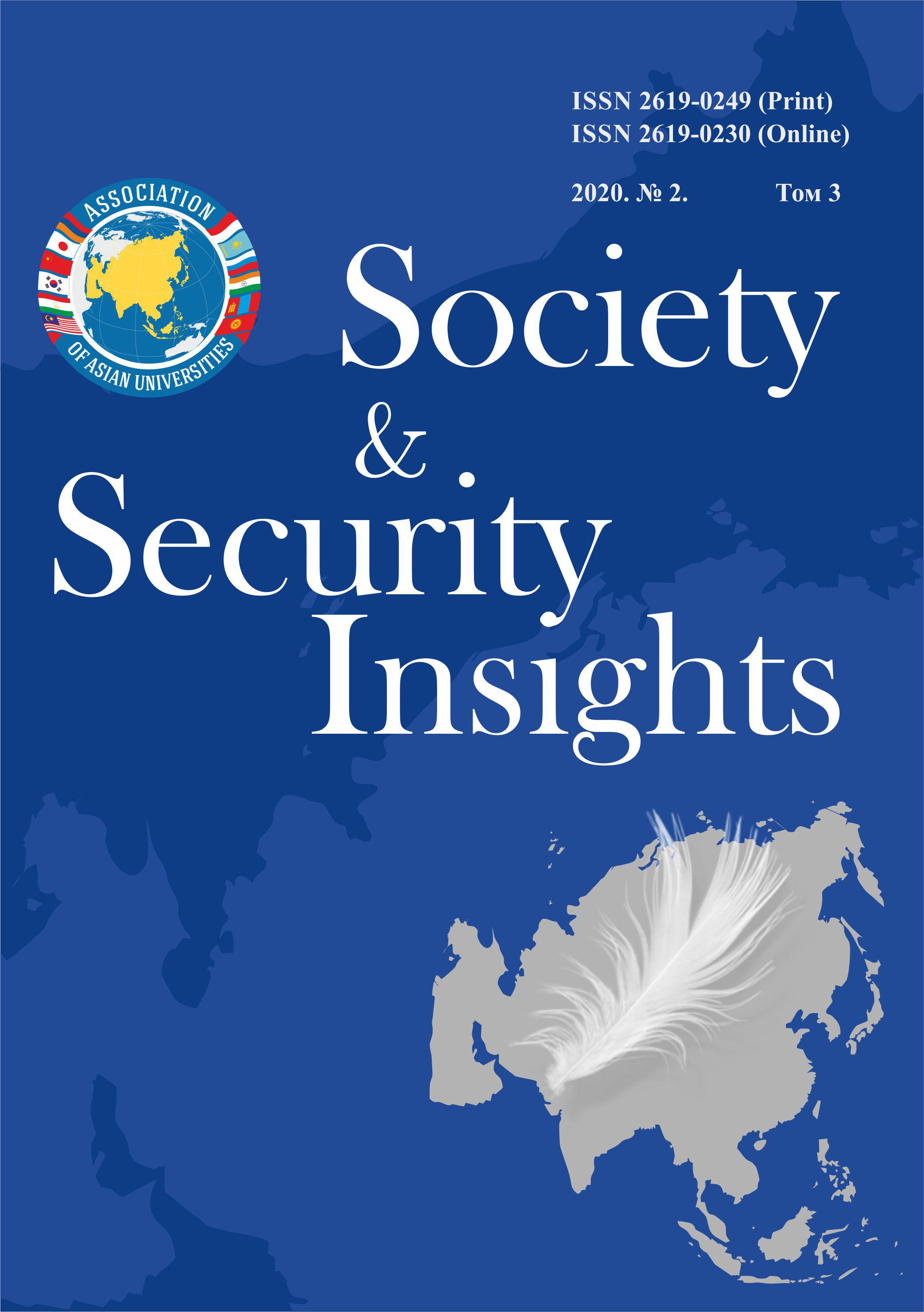PERSONAL SAFETY AS AN INDICATOR OF LIVING STANDARDS
Main Article Content
Abstract
The problem domain of the research covers the consideration and analysis of the personal safety assurance of citizens of contemporary Kazakhstan society. The current work is aimed at revealing, studying and theoretical conceptualization of information on personal safety as an indicator of population living standards. To achieve the goal of the research the following common scientific methods were used: analysis and synthesis, methods of comparison, functional and logical analysis, and methods of applied researches. The work presents the retrospective analysis of the “personal safety” notion, systematizes the existing approaches to the investigation of the essence that allowed revealing its main components. The work considers personal safety as one of the basic needs of humans that affects the population living standards. Within this context, the existing methods of population living standards assessment considering the personal safety factors were analyzed. Basing on the considered methods and research results of the international organizations, the comparative analysis of indicators related to personal safety in Kazakhstan and OECD countries was conducted on different indexes. The conducted comparisons allowed providing some assessment of the personal safety state of Kazakhstan citizens. Also, using the method of the linear combination of particular indicators to the integrated indicator the authors have calculated the indicator of economic safety of the population for the Almaty region that covers the personal safety indicators. The authors show the advantages and disadvantages of the applied method and provide recommendations on its application at different levels. The conclusions of the research can be taken as a base for an in-depth study on measuring the indicators of population personal safety in the context of living standards assurance.
Downloads
Metrics
Article Details

This work is licensed under a Creative Commons Attribution 4.0 International License.
Authors retain the copyright of their manuscripts, and all Open Access articles are distributed under the terms of the Creative Commons Attribution License, which permits unrestricted use, distribution, and reproduction in any medium, provided that the original work is properly cited.
References
Айдарова Г.Н., Каримуллин Т.А. Безопасный город в экстремальном мире. Постановка проблемы. Модель. Известия КазГАСУ, 2011, № 2 (16), 26 – 38.
Астахин А.С. Оценка обеспечения безопасности населения на основе анализа уровня и качества жизни населения Владимирской области. Ceteris Paribus, 2016, № 12, 17-22.
Данилина Л.Е., Салин В.Н. Анализ подходов к измерению качества жизни. Статистика и экономика, 2015, № 4, 107-114. doi: 10.21686/2500-3925-2015-4-107-114
Иванова Т.Е. Качество жизни и безопасность городской среды. Чрезвычайные ситуации: промышленная и экологическая безопасность, 2013, № 1-2 (13-14), 135-149.
Колобов О.А. и др. Безопасность личности, общества, государства. Т.1. Нижний Новгород: Изд-во АГПИ им.А.П. Гайдара; 2008.
Брандер П. и др. КОМПАС. Пособие по образованию в области прав человека с участием молодежи, Венгрия, 2002.
Пирумов В. Методология комплексного исследования проблем безопасности России. Москва: АЕН, 1994.
Римашевская Н.М. Человеческий потенциал России и проблемы «сбережения населения». Российский экономический журнал, 2004, 9–10, 22–40
OECD Better Life Index. Безопасность // URL: http://www.oecdbetterlifeindex.org/ru/topics/safety-ru/
Roland P. Human Security: Paradigm Shift or Hot Air? International Security. 2001, Vol. 26, 2, 96–98.
2018 Social Progress Index // URL: https://www.socialprogressindex.com/?tab=4&code=KAZ
REFERENCES
Abalkin, L. (1994). Ekonomicheskaya bezopasnost’ Rossii: ugrozy i ih otrazhenie [Russia’s economic security: threats and their reflection]. Voprosy ekonomiki, 12, 4–13.
Ajdarova, G.N., Karimullin, T.A. (2011). Bezopasnyj gorod v ekstremal’nom mire. Postanovka problemy. Model’ [Safe city in extremal world. Problem statement. Model]. Izvestiya KazGASU, 2 (16), 26–38.
Astahin, A.S. (2016). Ocenka obespecheniya bezopasnosti naseleniya na osnove analiza urovnya i kachestva zhizni naseleniya Vladimirskoj oblasti [Assessment of safety of the population on the basis of the analysis of level and quality of life of the population of the Vladimir region]. Ceteris Paribus, no. 12, 17–22.
Bezopasnost’: informacionnyj sbornik fonda nacional’noj i mezhdunarodnoj bezopasnosti [Security: informational kit of the Foundation on national and international security], 1994, 3 (19).
Brander, P., Kin, E., Leminar, M-L. (Eds.) (2002). Kompas: Posobie po obrazovaniyu v oblasti prav cheloveka s uchastiem molodezhi [COMPASS — A manual on human rights education with young people]. Council of Europe.
Danilina, L.E., Salin, V.N. (2015). Analiz podhodov k izmereniyu kachestva zhizni [Approaches to quality of life analysis quantification]. Statistika i ekonomika [Statistics and Economics], no. 4, 107–114.
Ivanova, T.E. (2013). Kachestvo zhizni i bezopasnost’ gorodskoj sredy [Quality of life and security in urban environment]. Chrezvychajnye situacii: promyshlennнja i ekologicheskaуa bezopasnost’ [Emergencies: industrial and ecological security], no. 1–2, 135–149.
Kolobov, O.A. (2008). Bezopasnost’ lichnosti, obshchestva, gosudarstva [Security of person, society and state]. Volume 1. Nizhnij Novgorod: Izd-vo AGPI named after A.P. Gajdar.
Pirumov, V. (1995). Metodologiya kompleksnogo issledovaniya problem bezopasnosti Rossii [Methodology of a comprehensive study of Russia’s security problems]. In: Problemy global’noj bezopasnosti [Global Security Issues] (pp. 49–76). Moscow: INION RAN.
OECD Better Life Index. Security. Available at: http://www.oecdbetterlifeindex.org/ru/topics/safety-ru/.
Roland, P. (2001). Human Security: Paradigm Shift or Hot Air? International Security, 26(2), 96–98.
2018 Social Progress Index. Available at: https://www.socialprogressindex. com/?tab=4&code=KAZ.


 https://orcid.org/0000-0002-6389-9637
https://orcid.org/0000-0002-6389-9637